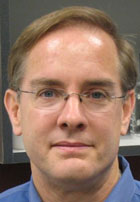Barry P. Sleckman, M.D., Ph.D., has been named the Conan Professor of Laboratory and Genomic Medicine at Washington University School of Medicine in St. Louis. Washington University Chancellor Mark S. Wrighton and Larry Shapiro, M.D., executive vice chancellor for medical affairs and dean of the School of Medicine, announced the appointment.

Sleckman is the second faculty member to hold the Conan Professorship in Laboratory and Genomic Medicine, which was endowed by Jack Ladenson, Ph.D., the Oree M. Carroll and Lillian B. Ladenson Professor of Clinical Chemistry in Pathology and Immunology. Ladenson established the chair in part from funds earned through the development of blood tests to detect myocardial infarction or heart attack.
“As an outstanding leader in teaching, research and administration, Barry Sleckman is a fine match for the Conan Professorship,” says Shapiro. “He is an outstanding basic scientist interested in DNA damage and repair. He’s a regular recipient of teaching awards at the School of Medicine, and his guidance helps to ensure that faculty in his division not only keep pace with the latest rapid advancements but also lead the way in developing new technologies and applying them to patient care.”
In July 2008, Sleckman became chief of the Division of Laboratory and Genomic Medicine in the Department of Pathology and Immunology.
“As Conan professorship donor Jack Ladenson so ably demonstrated with his work on heart attack tests, Laboratory and Genomic Medicine is one of the real foci of our efforts to translate bench results from the laboratory into new bedside diagnostics and treatments for patients,” says Wrighton. “I’m confident that Barry Sleckman will help such efforts move forward quickly and effectively as our new Conan Professor.”
Sleckman’s personal research focuses on DNA repair and the development of the early immune system. To develop properly, immune system cells have to rearrange some of their DNA. If these carefully regulated processes go awry, immune deficiency or cancer can result.
“Barry’s research is helping us to understand basic processes that establish the diversity and effectiveness of the immune system. His studies have implications that extend well beyond the immune system into understanding fundamental aspects of gene regulation and mechanisms of cancer induction,” says Herbert W. Virgin, M.D., Ph.D., Edward Mallinckrodt Professor and chair of Pathology and Immunology. “Quite simply, he is a fantastic leader, with vision and enthusiasm that will improve the department, School of Medicine, and University. His commitment to the training of students and residents also stands out as a true strength.”
Sleckman has received numerous teaching awards, including the Distinguished Service Teaching Award (2001, 2007), Professor of the Year (2003-2006) and Elective Course of the Year (2006).
Sleckman, who was born in Bermuda, earned a bachelor’s degree in biology at Lafayette College in 1983 and a medical degree and doctorate from Harvard University in 1989. He served fellowships at Brigham and Women’s Hospital, the Dana-Farber Cancer Institute and the Center for Blood Research, all in Boston. He was an instructor in medicine at Harvard prior to coming to Washington University as an assistant professor of pathology and immunology in 1998. Sleckman became associate professor of pathology and immunology in 2003, and he has been medical director of the Clinical Immunology Laboratory at the School of Medicine and Barnes-Jewish Hospital since 2005.
The professorship’s name originated with a researcher in Ladenson’s laboratory who played an important role in identifying the first antibodies used in heart attack tests. The researcher was a fan of Arnold Schwarzenegger and named an early antibody Conan after the barbarian hero Schwarzenegger portrayed in a movie. The antibody allowed scientists to quickly and accurately test for a form of an enzyme known as creatine kinase found in the heart, and this proved useful for diagnosing heart attacks. The name was later passed on to the professorship.
Washington University School of Medicine’s 2,100 employed and volunteer faculty physicians also are the medical staff of Barnes-Jewish and St. Louis Children’s hospitals. The School of Medicine is one of the leading medical research, teaching and patient care institutions in the nation, currently ranked third in the nation by U.S. News & World Report. Through its affiliations with Barnes-Jewish and St. Louis Children’s hospitals, the School of Medicine is linked to BJC HealthCare.